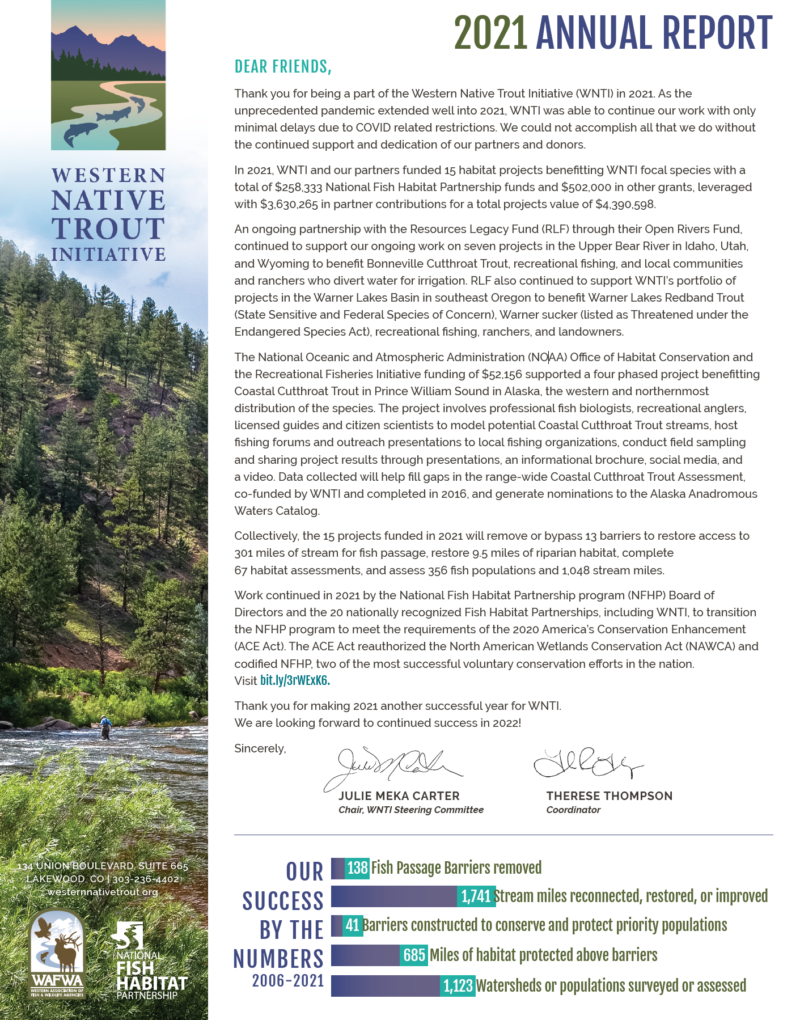2021 Annual Report Executive Summary
Since its inception in 2006, the Western Native Trout Initiative has directed over $6 million in federal fish habitat funds leveraged with over $47.6 million public and private matching dollars for 223 priority native trout conservation and outreach projects. By leveraging funding provided to WNTI by the National Fish Habitat Partnership, WNTI and over 350 partners to date, have successfully improved the status of western native trout populations in 12 western states including Alaska. With the collaboration and coordination of WNTI Partners, together we have removed 138 barriers to fish passage, reconnected or improved 1,741 miles of native trout habitat, and placed 41 protective fish barriers to conserve important native trout conservation populations. In addition, WNTI has funded 1,123 watershed, fish population and habitat surveys.
In 2021, WNTI and our partners funded 15 habitat projects benefitting WNTI focal species with a total of $258,333 National Fish Habitat Partnership funds and $502,000 in other grants, leveraged with $3,630,265 in partner contributions for a total projects value of $4,390,598.
An ongoing partnership with the Resources Legacy Fund (RLF) through their Open Rivers Fund, continued to support our ongoing work on seven projects in the Upper Bear River in Idaho, Utah, and Wyoming to benefit Bonneville Cutthroat Trout, recreational fishing, and local communities and ranchers who divert water for irrigation. RLF also continued to support WNTI’s portfolio of projects in the Warner Lakes Basin in southeast Oregon to benefit Warner Lakes Redband Trout (State Sensitive and Federal Species of Concern), Warner sucker (listed as Threatened under the Endangered Species Act), recreational fishing, ranchers, and landowners.
The National Oceanic and Atmospheric Administration (NOAA) Office of Habitat Conservation and the Recreational Fisheries Initiative funding of $52,156 supported a four phased project benefitting Coastal Cutthroat Trout in Prince William Sound in Alaska, the western and northernmost distribution of the species. The project involves professional fish biologists, recreational anglers, licensed guides and citizen scientists to model potential Coastal Cutthroat Trout streams, host fishing forums and outreach presentations to local fishing organizations, conduct field sampling and sharing project results through presentations, an informational brochure, social media, and a video. Data collected will help fill gaps in the range-wide Coastal Cutthroat Trout Assessment, co-funded by WNTI and completed in 2016, and generate nominations to the Alaska Anadromous Waters Catalog.
Collectively, the 15 projects funded in 2021 will remove or bypass 13 barriers to restore access to 301 miles of stream for fish passage, restore 9.5 miles of riparian habitat, complete 67 habitat assessments, and assess 356 fish populations and 1,048 stream miles.
Work continued in 2021 by the National Fish Habitat Partnership program (NFHP) Board of Directors and the 20 nationally recognized Fish Habitat Partnerships, including WNTI, to transition the NFHP program to meet the requirements of the 2020 America’s Conservation Enhancement (ACE Act). The ACE Act reauthorized the North American Wetlands Conservation Act (NAWCA) and codified NFHP, two of the most successful voluntary conservation efforts in the nation. Visit bit.ly/3rWExK6.
Attached Files
| File | Action |
|---|---|
| WNTI22_AnnualReport2021_FINAL.pdf | Download |
- Version
- File Type pdf
- File Size 8.33 MB
- Publication Date August 10, 2022
- Download Count [1272]
- View Count [10]
